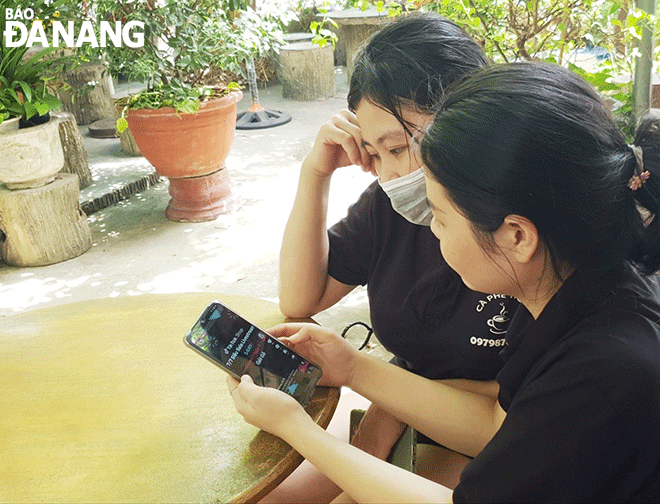Teenagers addicted to TikTok
Joining TikTok, a growing social media app where people can make short videos, has become a trend of many people, especially the young. Besides benefits to life, many TikTok videos are highly addictive and not age-appropriate for teenagers.
TikTok is a short-form, video-sharing app that allows users to create and share 15-second videos, on any topic to seek attention and fame. Unlike video platforms like YouTube or Instagram, each TikTok video is only 3-15 seconds in length and features many beautiful effects combined with attractive background music, thereby attracting much attention from children and teenagers.
 |
| TikTok, a growing social media app where people can make short videos, has risen in popularity over the past years |
Many worries
Mrs. D.T living in Son Tra District said that her 8-year-old boy became addicted to TikTok as he started to be allowed to use smartphone
“My mistake was to let my son use smartphone without control. When I found out, I confiscated the phone at first, and then I often spend more time with him such as taking him to bookstores and public parks, and letting him join life skill training classes. Thanks to that, my son gradually forgets about the smartphone and only uses it when necessary" said she.
Similarly, Ms. H.G, residing in Thanh Khe District, found that her girl showed signs of ‘addiction’ to TikTok.
“At that time, I ask her to use limited social networks. I still let my girl use TikTok, but I have to remove videos with inappropriate content or bad comments. I also have to check her posted videos in order to minimise my children's exposure to bad content that causes psychological effects” said the woman.
Mr. Nguyen Van Dung, a senior software engineer of the KMS Company - a software development and consulting company being headquartered in the US and opening many subsidiary centres in Viet Nam, said like a number of other social networking platforms, TikTok is an ‘entertainment’ platform where users can exchange, chat, and watch entertainment content.
He added, TikTok was quite successful when it comes to capturing users’ psychology, allowing users to create short videos with adding effects, edit videos quickly, and make money when making ads.
Mr. Dung explained the reason why TikTok can become addictive seem to be that TikTok users can also easily update the hottest ‘trends’ available in the world.
Setting up parental controls to keep kids safe
Since early the year, the municipal Youth Union has organised many training courses on enhancing their skills using the internet and social networks, and preventing the negative impact of harmful products on cyberspace for its members and young people at 15 primary schools citywide.
Most recently, the unit has organised online training courses on digital technology and employment skills for senior high school students. The purpose is to help young people to understand how manage screen time, as well as instruct them how to detect cases of contradictions, conflicts and threats in cyberspace.
“The training courses not only help them gain knowledge to distinguish and evaluate information sources, and have logical thinking, from which to make appropriate decisions, but also give them helpful skills to be ready to accept the opportunities that the Internet brings and can use the network safely”, said Deputy Secretary of the municipal Youth Union Nguyen Thi Anh Thao.
According to Master of Psychology Nguyen Thi Hong Nhung, a lecturer at the Psychology - Education Faculty of the Da Nang University of Education, social networks have many advantages but also pose numerous potential threats and psychological effects to children.
She, therefore, stressed the need for parents to equip their children with necessary skills so that the children are not taken advantage of or bullied in the online environment.
Also, she encourages parents to set an example for their children by not posting inappropriate comments or sharing of clips with bad content. In addition, parents need to set limits on kids' social media use and accompany them when they have problems.
Mr. Nguyen Van Dung said that, in addition to the coordination of families, schools and children themselves, it is necessary to make laws to limit and strictly manage harmful content on social networks. He also suggested that functional sectors could apply artificial intelligence (AI) to social network management, as well as filter, block, and report harmful content on social networks, and penalise TikTokers who intentionally violate it.
Reporting THANH TINH - Translating by M.DUNG